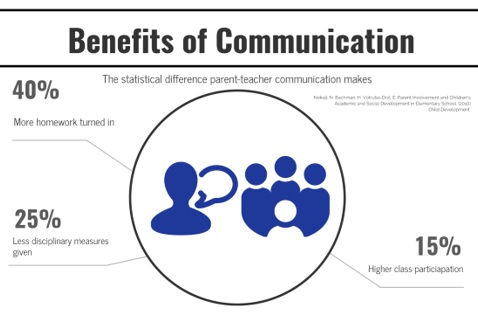Building Stronger Educational Partnerships: The Importance of Communication Between Parents and Schools
15th October 2024

In the modern educational landscape, the importance of communication between schools and parents cannot be overstated. Effective communication is pivotal in fostering positive relationships, improving student outcomes, and creating a supportive environment for children to thrive academically and socially. Schools and families are both key stakeholders in a child's education and when they collaborate, the benefits extend far beyond the classroom.
The Foundation of Student Success
A child’s educational journey is not solely the responsibility of the school; it is a collaborative effort between educators and parents. Clear and consistent communication forms the foundation of this partnership. When parents are informed about their child’s progress, challenges, and achievements, they are better equipped to support learning at home and make informed decisions regarding their child's education.

Source: theschoolcommunicationsagency.com
Similarly, when schools maintain open lines of communication with parents, they can gain valuable insights into a student's needs, family dynamics, and the support structures available outside the school environment. Research has shown that students whose parents are actively involved in their education tend to perform better academically, have improved attendance rates, and exhibit better social behavior.
Strengthening the Home-School Relationship
The relationship between schools and parents is built on trust and mutual respect, both of which are nurtured through regular communication. Schools that prioritize transparency and frequent updates create a positive rapport with families, fostering a sense of partnership. When schools reach out to parents not only to report concerns but also to celebrate successes, they create an environment where communication is viewed as a tool for collaboration, not merely crisis management.
Parents, in turn, feel more confident in their ability to contribute to their child’s education when they are kept informed. Whether it’s updates about classroom activities, homework assignments, school policies, or upcoming events, consistent communication helps parents feel connected and involved. This involvement can take various forms, such as participating in parent-teacher conferences, volunteering at school events, or simply staying engaged with the school community.
Early Identification of Issues
One of the most significant advantages of strong communication between schools and parents is the early identification and resolution of potential issues. When teachers and parents communicate regularly, they are more likely to notice patterns or challenges that may affect a student's academic or emotional well-being.
Early detection of learning difficulties, behavioral challenges, or social issues enables timely intervention, providing the necessary support before problems escalate. Whether it’s arranging for additional tutoring, providing emotional support, or fostering better peer interactions, collaboration between schools and parents leads to more effective solutions that benefit the student.
Enhancing Emotional and Social Development
Beyond academics, communication between schools and parents plays a crucial role in a child’s emotional and social development. School is a primary environment where children learn to interact with others, build friendships, and navigate social norms. However, parents often have a deeper understanding of their child's personality, strengths, and areas for growth.
By maintaining strong communication, schools can collaborate with parents to ensure that a child's social and emotional needs are met. When parents and schools communicate openly about a student's emotional and social development, children are more likely to feel supported and understood, both at home and in the classroom.
Adapting to Changing Needs
The modern educational landscape is continually evolving, and schools are tasked with adapting to new challenges, such as technological advancements and shifts in curricula. Whether it’s navigating remote learning, understanding new assessment methods, or addressing concerns about health and safety protocols, parents rely on schools to provide accurate, timely information.
In times of uncertainty, consistent communication helps to alleviate anxiety and confusion. Parents feel more secure when they are well-informed about changes that may affect their child's education. Schools, in turn, benefit from parent feedback, which can help shape policies and practices to better meet the needs of students and families.
Encouraging Parent Engagement
Strong communication between schools and parents not only keeps parents informed but also encourages them to take an active role in their child's education. When parents feel welcomed and valued as partners in the educational process, they are more likely to engage in school activities and support learning initiatives at home.
This engagement can range from helping with homework to attending school events or volunteering in the classroom. Schools can encourage parent involvement by providing opportunities for meaningful participation and creating a welcoming environment that respects and values the contributions of all families. A school that fosters open communication and encourages dialogue creates a sense of community that benefits both students and parents.
Tools for Effective Communication
In today's digital age, schools have access to a wide range of tools to facilitate communication with parents. Emails, newsletters, school websites, and mobile apps provide convenient ways for schools to share information and updates. Additionally, many schools use platforms that allow parents to monitor their child’s academic progress, attendance, and behavior in real time. These tools make it easier for parents to stay informed and engaged, even with busy schedules.
However, it’s essential for schools to ensure that communication methods are accessible and inclusive for all families. Language barriers, technological limitations, and differing communication preferences can create challenges. Schools should strive to offer multiple forms of communication to meet the diverse needs of their parent community, ensuring that all families feel included and informed.
Conclusion
The importance of communication between schools and parents cannot be overstated. Therefore as leaders, you must first pursue educational administration and management in Indonesia to support student success, emotional well-being, and social development.
We believe education should be accessible to everyone. That’s why we don’t charge for our blogs. Find the right course that will help you in your career with us, contact us at - 6531631068. You can mail us at act@asiancollegeofteachers.com.
Written By : Sanjana



